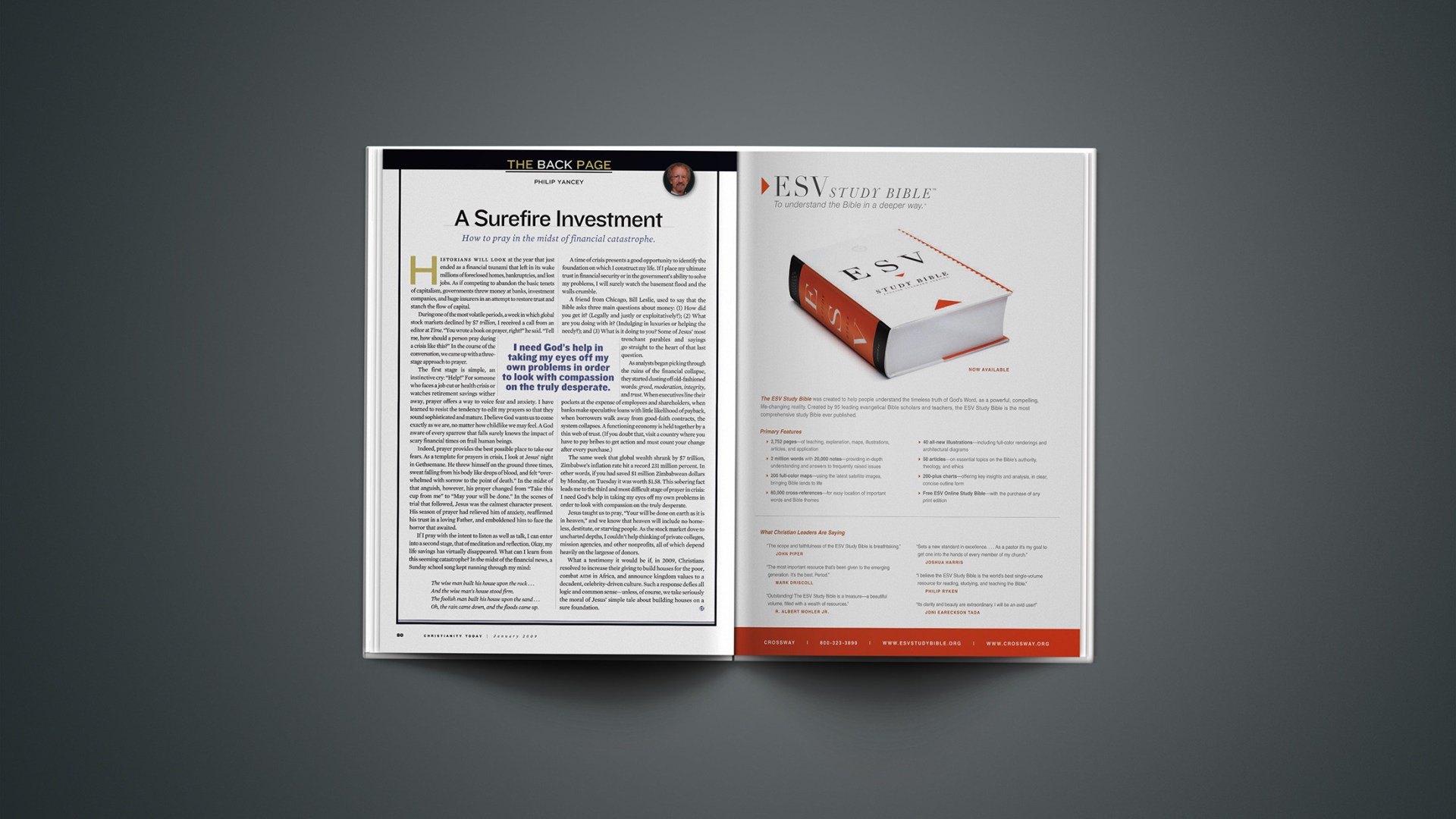Historians will look at the year that just ended as a financial tsunami that left in its wake millions of foreclosed homes, bankruptcies, and lost jobs. As if competing to abandon the basic tenets of capitalism, governments threw money at banks, investment companies, and huge insurers in an attempt to restore trust and stanch the flow of capital.
During one of the most volatile periods, a week in which global stock markets declined by $7 trillion, I received a call from an editor at Time. “You wrote a book on prayer, right?” he said. “Tell me, how should a person pray during a crisis like this?” In the course of the conversation, we came up with a three-stage approach to prayer.
The first stage is simple, an instinctive cry: “Help!” For someone who faces a job cut or health crisis or watches retirement savings wither away, prayer offers a way to voice fear and anxiety. I have learned to resist the tendency to edit my prayers so that they sound sophisticated and mature. I believe God wants us to come exactly as we are, no matter how childlike we may feel. A God aware of every sparrow that falls surely knows the impact of scary financial times on frail human beings.
Indeed, prayer provides the best possible place to take our fears. As a template for prayers in crisis, I look at Jesus’ night in Gethsemane. He threw himself on the ground three times, sweat falling from his body like drops of blood, and felt “overwhelmed with sorrow to the point of death.” In the midst of that anguish, however, his prayer changed from “Take this cup from me” to “May your will be done.” In the scenes of trial that followed, Jesus was the calmest character present. His season of prayer had relieved him of anxiety, reaffirmed his trust in a loving Father, and emboldened him to face the horror that awaited.
If I pray with the intent to listen as well as talk, I can enter into a second stage, that of meditation and reflection. Okay, my life savings has virtually disappeared. What can I learn from this seeming catastrophe? In the midst of the financial news, a Sunday school song kept running through my mind:
The wise man built his house upon the rock …
And the wise man’s house stood firm.
The foolish man built his house upon the sand …
Oh, the rain came down, and the floods came up.
A time of crisis presents a good opportunity to identify the foundation on which I construct my life. If I place my ultimate trust in financial security or in the government’s ability to solve my problems, I will surely watch the basement flood and the walls crumble.
A friend from Chicago, Bill Leslie, used to say that the Bible asks three main questions about money: (1) How did you get it? (Legally and justly or exploitatively?); (2) What are you doing with it? (Indulging in luxuries or helping the needy?); and (3) What is it doing to you? Some of Jesus’ most trenchant parables and sayings go straight to the heart of that last question.
As analysts began picking through the ruins of the financial collapse, they started dusting off old-fashioned words: greed, moderation, integrity, and trust. When executives line their pockets at the expense of employees and shareholders, when banks make speculative loans with little likelihood of payback, when borrowers walk away from good-faith contracts, the system collapses. A functioning economy is held together by a thin web of trust. (If you doubt that, visit a country where you have to pay bribes to get action and must count your change after every purchase.)
The same week that global wealth shrank by $7 trillion, Zimbabwe’s inflation rate hit a record 231 million percent. In other words, if you had saved $1 million Zimbabwean dollars by Monday, on Tuesday it was worth $158. This sobering fact leads me to the third and most difficult stage of prayer in crisis: I need God’s help in taking my eyes off my own problems in order to look with compassion on the truly desperate.
Jesus taught us to pray, “Your will be done on earth as it is in heaven,” and we know that heaven will include no homeless, destitute, or starving people. As the stock market dove to uncharted depths, I couldn’t help thinking of private colleges, mission agencies, and other nonprofits, all of which depend heavily on the largesse of donors.
What a testimony it would be if, in 2009, Christians resolved to increase their giving to build houses for the poor, combat AIDS in Africa, and announce kingdom values to a decadent, celebrity-driven culture. Such a response defies all logic and common sense — unless, of course, we take seriously the moral of Jesus’ simple tale about building houses on a sure foundation.
Copyright © 2009 Christianity Today. Click for reprint information.
Related Elsewhere:
Yancey’s previous columns are available on our site.
Christianity Today also has a special section on the economic crisis.










